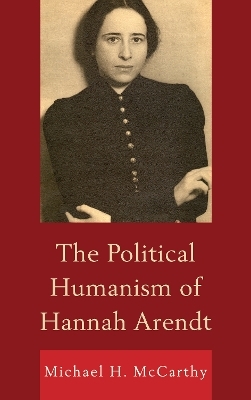
The Political Humanism of Hannah Arendt
Seiten
2014
Lexington Books (Verlag)
978-0-7391-9287-0 (ISBN)
Lexington Books (Verlag)
978-0-7391-9287-0 (ISBN)
This critical study of Arendt explores the sources and dangers of political alienation in the West from the citizen republics of classical antiquity to the consumer societies of modern liberal democracies. It is a sympathetic appraisal of the high promise and great perils of the political life (the bios politikos).
At the end of the Second World War when the horror of the holocaust became known, Hannah Arendt committed herself to a work of remembrance and reflection. Intellectual integrity demanded that we comprehend and articulate the genesis and meaning of totalitarian terror. What earlier spiritual and moral collapse had made totalitarian regimes possible? What was the basis of their evident mass appeal? To what cultural resources and political institutions and traditions could we turn to prevent their recurrence? After years of profound study, Arendt concluded that the deepest crisis of the modern world was political and that the enduring appeal of political mass movements demonstrated how profound that crisis had become.
For Arendt the modern political crisis is also a crisis of humanism. The radical totalitarian experiment was rooted in two distorted images of the human being. The agents of terror believed in the limitless power generated by strategic organization, a power exercised without restraint and justified by appeal to historical necessity. The victims of terror, by contrast, were systematically dehumanized by the ruling ideology, and then brutally deprived of their legal rights and their moral and existential dignity. Arendt’s political humanism directly challenges both of these distorted images, the first because it dangerously inflates human power, the second because it deliberately subverts human freedom and agency.
This book offers a dialectical account of the political crisis that Arendt identified and shows why her interpretation of that crisis is especially relevant today. The author also provides detailed analysis and appraisal of Arendt’s political humanism, the revisionary anthropology she based on the politically engaged republican citizen. Finally, the work distinguishes the merits from the limitations of Arendt’s genealogical critique of “our tradition of political thought”, showing that she tended to be right in what she affirmed and wrong in what she excluded or omitted.
At the end of the Second World War when the horror of the holocaust became known, Hannah Arendt committed herself to a work of remembrance and reflection. Intellectual integrity demanded that we comprehend and articulate the genesis and meaning of totalitarian terror. What earlier spiritual and moral collapse had made totalitarian regimes possible? What was the basis of their evident mass appeal? To what cultural resources and political institutions and traditions could we turn to prevent their recurrence? After years of profound study, Arendt concluded that the deepest crisis of the modern world was political and that the enduring appeal of political mass movements demonstrated how profound that crisis had become.
For Arendt the modern political crisis is also a crisis of humanism. The radical totalitarian experiment was rooted in two distorted images of the human being. The agents of terror believed in the limitless power generated by strategic organization, a power exercised without restraint and justified by appeal to historical necessity. The victims of terror, by contrast, were systematically dehumanized by the ruling ideology, and then brutally deprived of their legal rights and their moral and existential dignity. Arendt’s political humanism directly challenges both of these distorted images, the first because it dangerously inflates human power, the second because it deliberately subverts human freedom and agency.
This book offers a dialectical account of the political crisis that Arendt identified and shows why her interpretation of that crisis is especially relevant today. The author also provides detailed analysis and appraisal of Arendt’s political humanism, the revisionary anthropology she based on the politically engaged republican citizen. Finally, the work distinguishes the merits from the limitations of Arendt’s genealogical critique of “our tradition of political thought”, showing that she tended to be right in what she affirmed and wrong in what she excluded or omitted.
Michael H. McCarthy taught philosophy for thirty-eight years at Vassar College before retiring from teaching in 2007. He has been a visiting fellow at the Woodstock Theological Center at Georgetown University and a Lonergan Fellow at Boston College.
Introduction: The Political Humanism of Hannah Arendt
Chapter 1: The City in Ruins
Chapter 2: Look to the Great and Common World
Chapter 3: Our Tradition of Political Thought
Chapter 4: The Marxist Reversals of Tradition
Chapter 5: Part I: The Discontents of Liberal Democracy
Chapter 5: Part II: The Continuing Relevance of Arendtian Thought
| Verlagsort | Lanham, MD |
|---|---|
| Sprache | englisch |
| Maße | 154 x 227 mm |
| Gewicht | 490 g |
| Themenwelt | Geisteswissenschaften ► Philosophie ► Ethik |
| Geisteswissenschaften ► Philosophie ► Philosophie des Mittelalters | |
| Geisteswissenschaften ► Philosophie ► Philosophie der Neuzeit | |
| Sozialwissenschaften ► Politik / Verwaltung ► Politische Theorie | |
| ISBN-10 | 0-7391-9287-6 / 0739192876 |
| ISBN-13 | 978-0-7391-9287-0 / 9780739192870 |
| Zustand | Neuware |
| Haben Sie eine Frage zum Produkt? |
Mehr entdecken
aus dem Bereich
aus dem Bereich
unsere kollektive Verantwortung
Buch | Hardcover (2023)
wbg Theiss in Wissenschaftliche Buchgesellschaft (WBG) (Verlag)
35,00 €


